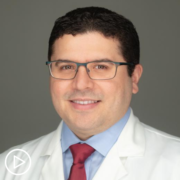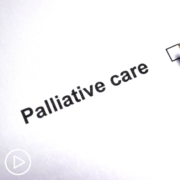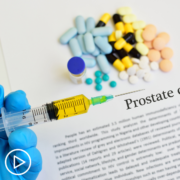Dr. Yaw Nyame: Why Is It Important for You to Empower Patients?
Dr. Yaw Nyame: Why Is It Important for You to Empower Patients? from Patient Empowerment Network on Vimeo.
Patient empowerment is a vital part of care, but how can healthcare providers help? Prostate cancer expert Dr. Yaw Nyame with the University of Washington shares his approach to patient care and connections that he provides to help ensure optimal patient outcomes.
See More from Empowering Providers to Empower Patients (EPEP)
Related Resources:

|

|

Dr. Danielle Brander: Why Is It Important for You to Empower Patients? |
Transcript:
Lisa Hatfield:
Dr. Nyame, how do you empower your patients and their care partners? And why is that important?
Dr. Yaw Nyame:
I think the best way to empower patients and their care partners is just by giving them the time. My clinic always runs late…I’m not sure that’s something I should brag about but it always runs late, and when I come into a room, I always say, “I’m sorry, I’m running late.” I usually explain if someone needed more time before then, and I always end that with, “I’m going to give you the same time that you need to answer all your questions and have your needs met as the last person, and so don’t worry about what the clock says about when your appointment was supposed to be. Let’s just cover what we need to cover.”
I also jot quite a bit of notes, a lot of families come in with notebooks and they’re writing everything down, and I try to actually have some notes that are individualized to my patient, their particular cancer and what are my recommendations down on a sheet of paper that I give to them. It’s almost like a deliverable for that visit, which I think oftentimes takes the burden of the patient feeling like they’re the one that has to collect all this information, and it’s almost like I’m going to be in charge of collecting this and giving it to you at the very end of our visit.
And then lastly, I’m really big on trying to connect folks to the resources that they need socially or clinically, and so everyone gets a list of vetted resources to read more or to go back to if they have questions, everyone gets connected to advocacy organizations that I do work with and trust, and then lastly everyone gets my contact info, sometimes a cell phone number, sometimes an email, something where they feel like they can get reconnected to me. That’s my approach, some people would say that’s too much, but I find that the more ways I can allow patients to feel like I’m accessible, that I’m at their level, that I’m not some super human, whatever, but I’m just like their neighbors or friends, the people that are in their community, the more empowered they are to ask for the things that they need and ultimately have a better clinical experience and outcomes.






